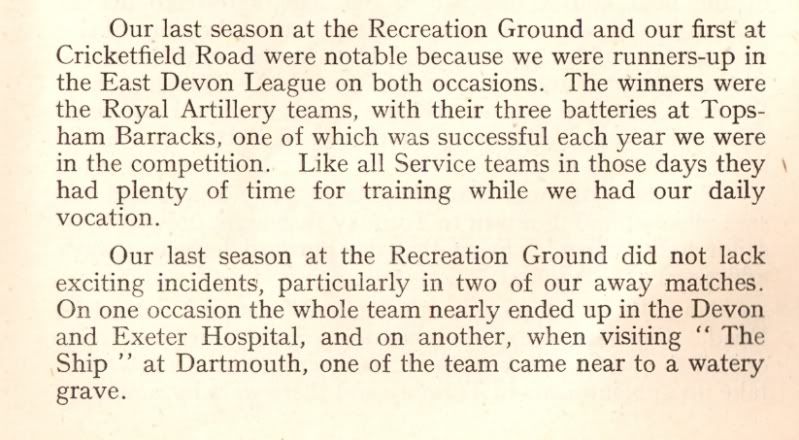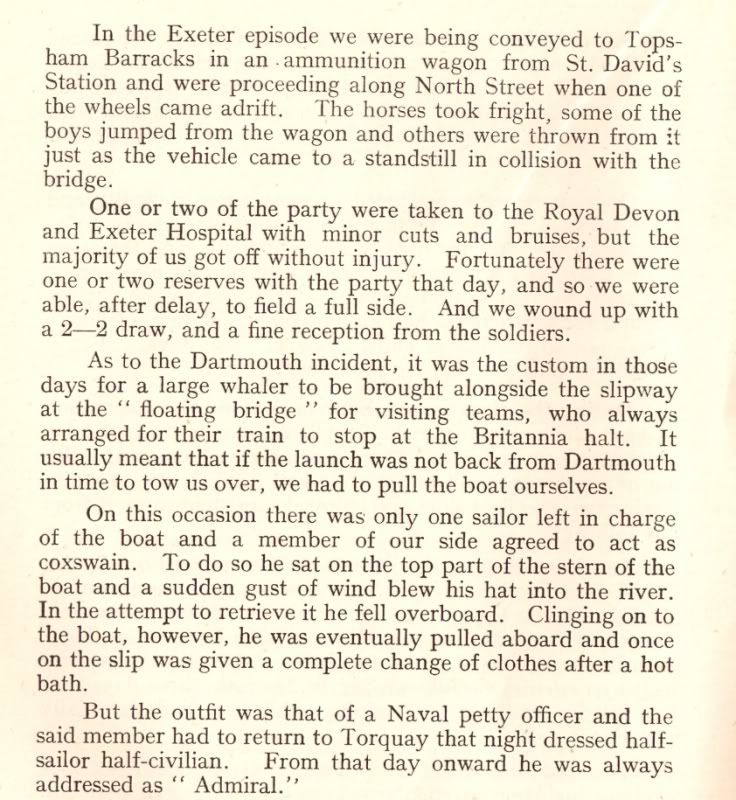Jon
Admin 
Posts: 6,912
|
Post by Jon on Dec 16, 2009 22:57:35 GMT
a ferry over to Dartmouth.......... .... as far as I know apart from some old lady one day selecting reverse gear and going off the back of the ferry, there has never been any accidents happen with the ferry. What about this near fatality at Dartmouth?   This is from WJ Luscombe’s history of TUFC. He says that both incidents happened in the 1904/05 season – TUFC’s last at the Rec. Actually, TUFC’s last season at the Rec was 1903/04. The Exeter incident actually took place on 13 April 1901. I don’t know when the Dartmouth incident happened. Have I ever mentioned that Luscombe is useless on dates?  |
|
Dave
TFF member

Posts: 13,081
|
Post by Dave on Dec 16, 2009 23:05:43 GMT
I think you may have Jon, but I'm not to sure  You have to say we writes very interesting story's and I really enjoyed reading this one, thanks for putting it up. |
|
Deleted
Deleted Member
Posts: 0
|
Post by Deleted on Dec 21, 2009 15:21:57 GMT
I think you may have Jon, but I'm not to sure  You have to say we writes very interesting story's and I really enjoyed reading this one, thanks for putting it up. And maybe that’s how it’s best to remember Bill Luscombe – as a teller of “interesting tales”, some of which may even have been true. Jon says he was useless with dates and – from checking other parts of his history - it appears he wasn’t too hot on names, places or events either. But he wasn’t alone in that way. I’m reading a book by Julian Norridge called Can we have our balls back, please? (How the British invented sport – and then almost forgot how to play it). In this, Norridge looks at the historical background to over a dozen sports that were pretty much devised by the British. And, from what I’ve read so far, some pretty dodgy storytelling seems to have gone on. For example, rugby union and the claim that William Webb Ellis invented the sport by picking up the ball in a school match at Rugby in 1823. He may well have run with the ball around then, but there’s more than a suggestion – according to this book (and, as I’ve done no further research myself, I’m reliant on its accuracy) – that countless other Rugby boys were doing likewise several years before 1823. Webb Ellis – a man known to blow his own trumpet on occasions – apparently never said anything about his role in the game’s invention and – allegedly - he only gets a mention in the whole process because a former pupil told his older brother about a random game when Webb Ellis was one of those who handled the ball. That older brother – Matthew Bloxham – then slips the story into a “looking back” article in the school magazine nearly sixty years afterwards. His explanation is later - without further checks being made - adopted by an Old Rugbeians committee set up in 1895 to defend the school’s honour against counter-claims about the game’s origins. Thereafter it becomes established “fact”. Likewise, baseball and the efforts made to show it was a 100% American invention rather than a derivative of rounders, stoolball or even an old English game called “base ball”. The American game’s first recognised reporter – Henry Chadwick, a Devonian from Exeter – was firmly of the opinion baseball had English origins. This didn’t go down too well and the debate continued for decades with Albert Spalding, an ex-baseball star and founder of the sports goods manufacturer, being particularly keen on proving the sport’s American roots. Then, as his campaign reached its zenith in 1905, a letter was received from an old man claiming the game was invented by Abner Doubleday, a civil war hero, in a place called Cooperstown in 1839. This fitted Spalding’s agenda and became the “official” story to the extent the Baseball Hall of Fame was eventually established in Cooperstown. But in 1939 just as – and Jon may appreciate this – the game was about to celebrate its "centenary", somebody throws a spanner in the works and demolishes the whole story. Now, according to Norridge, we’re left with a theory which says Abner Graves, who sent the 1905 letter, may have played baseball in the late 1830s with another Abner Doubleday altogether (perhaps a cousin of the Civil War man). This Abner Doubleday, in order to impress Graves and his young friends who’d not seen the game before, may have bragged - in an act of youthful bravado - that baseball was his own invention. So what to make of this? Well, I’d be charitable to both Matthew Bloxham and Abner Graves for simply passing on something they’d both thought was true for sixty years of their lives. Equally, the Old Rugebeians and the baseball authorities may have naively accepted the word of Bloxham and Graves respectively because they “were there” and it’s respectful to acknowledge the memories of our elders. Alternatively, of course, you could accuse them of “lazy” history – failing to check sources – or even gleefully, wilfully accepting (and twisting) half-baked stories which neatly fitted their own agendas. Who knows? And, yes, I’ve taken my stories from a book in which I’ve already spotted inaccuracies…. |
|
Dave
TFF member

Posts: 13,081
|
Post by Dave on Dec 21, 2009 20:30:21 GMT
But is it not the inaccuracies Nick, that make the likes of you and Jon so mad on history? It would be boring if everything was 100% accurate, half the fun Jon gets is trying to make sure what he reads or learns is 100% correct and when he feels it may be wrong, then get gets to work to try and find out one way or the other. He has not won his argument with me yet about the year the SDL was set up, he says I have no letters or papers to prove what I say might have been the reason they use the year 1902, but as I said to him, he has no letters or papers to really prove I'm wrong  |
|
Jon
Admin 
Posts: 6,912
|
Post by Jon on Dec 21, 2009 20:55:06 GMT
He has not won his argument with me yet about the year the SDL was set up, he says I have no letters or papers to prove what I say might have been the reason they use the year 1902, but as I said to him, he has no letters or papers to really prove I'm wrong  I believe that the South Devon League was founded in 1887. That makes it the oldest footballl league in the world! My argument is that you shouldn't count when a league actually started, but when people started thinking about it. You know how slow Devonians are. Nobody can prove me wrong, so that makes it true!  |
|
Deleted
Deleted Member
Posts: 0
|
Post by Deleted on Dec 22, 2009 8:50:01 GMT
But is it not the inaccuracies Nick, that make the likes of you and Jon so mad on history? Yes, noticing - and correcting - inaccuracies is part of the challenge but the wider appeal is how we interpret history. Imagine if, the day after Wembley, we’d all written two paragraphs about the two seasons in the Conference. Now imagine that, God willing, we all repeat the exercise ten years afterwards. There would almost certainly be differences in our own accounts let alone between how others saw the same events. |
|